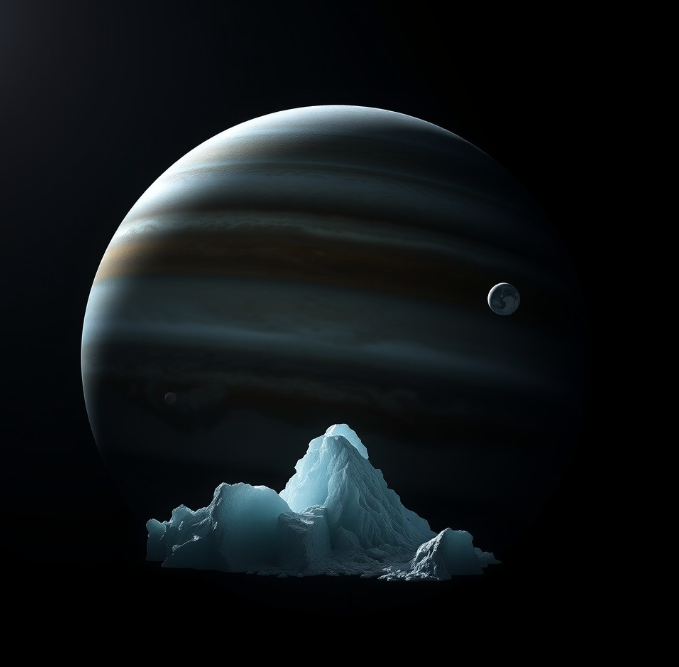TRADING THE TRUTH FOR A LIE
Bible Study / Daily Devotional
Daily Devotions
Average reading time is about 5 and a half minutes
AN AMAZING FACT: The fourth-brightest object in the sky is Jupiter, which is two and a half times larger than all the other planets, satellites, asteroids, and comets of our solar system combined. Yet, in spite of Jupiter’s immense size, it has the shortest day. Although it has a circumference of 280,000 miles, compared with Earth’s 25,000, Jupiter manages to make one turn in nine hours and fifty-five minutes.
Jupiter’s Great Red Spot, one of the planet’s most recognizable features, is 25,000 miles wide. The spot may be the vortex of a hurricane that has been whirling for at least seven centuries. It rotates differently than the rest of Jupiter’s atmosphere, and has a variable speed of rotation.
Jupiter doesn’t have a solid surface but is composed mainly of the gases hydrogen and helium. This jumbo planet has over 60 known satellites, most of them small. Its four biggest moons—Ganymede, Io, Europa, and Callisto—are large enough that Galileo spotted them with his telescope in the early 17th century. Ganymede is the largest moon in our solar system, even surpassing Mercury in size. And Io is well known for its energetic volcanoes.
Although not as distinct as those of Saturn, Jupiter also has rings. The Voyager I space probe first observed these rings in 1979. These are believed to have formed, at least in part, from dust particles ejected from some of Jupiter’s moons as a result of high-velocity impacts.
In Roman mythology, Jupiter (or Jove), was the ruler of the gods. Originally the god of the sky and king of heaven, Jupiter was worshiped as the god of rain, thunder, and lightning. As the protector of Rome, he was called Jupiter Optimus Maximus (“the best and greatest”).
What was it that led the great civilizations like Rome and Greece to worship the creation instead of the Creator? The Bible records that they made all sorts of wrong choices in their lives. Since the true God would not approve of their self-destructive lifestyle, they invented gods who would allow them to live as they pleased—in lust and dishonor. Scripture sadly confirms that they traded the truth for a lie.
KEY BIBLE TEXTS
Wherefore God also gave them up to uncleanness through the lusts of their own hearts, to dishonour their own bodies between themselves: Romans 1:24Who changed the truth of God into a lie, and worshipped and served the creature more than the Creator, who is blessed for ever. Amen. Romans 1:25
TRADING THE TRUTH FOR A LIE
Bible Study / Daily Devotional
Daily Devotions
Average reading time is about 5 and a half minutes
AN AMAZING FACT: The fourth-brightest object in the sky is Jupiter, which is two and a half times larger than all the other planets, satellites, asteroids, and comets of our solar system combined. Yet, in spite of Jupiter’s immense size, it has the shortest day. Although it has a circumference of 280,000 miles, compared with Earth’s 25,000, Jupiter manages to make one turn in nine hours and fifty-five minutes.
Jupiter’s Great Red Spot, one of the planet’s most recognizable features, is 25,000 miles wide. The spot may be the vortex of a hurricane that has been whirling for at least seven centuries. It rotates differently than the rest of Jupiter’s atmosphere, and has a variable speed of rotation.
Jupiter doesn’t have a solid surface but is composed mainly of the gases hydrogen and helium. This jumbo planet has over 60 known satellites, most of them small. Its four biggest moons—Ganymede, Io, Europa, and Callisto—are large enough that Galileo spotted them with his telescope in the early 17th century. Ganymede is the largest moon in our solar system, even surpassing Mercury in size. And Io is well known for its energetic volcanoes.
Although not as distinct as those of Saturn, Jupiter also has rings. The Voyager I space probe first observed these rings in 1979. These are believed to have formed, at least in part, from dust particles ejected from some of Jupiter’s moons as a result of high-velocity impacts.
In Roman mythology, Jupiter (or Jove), was the ruler of the gods. Originally the god of the sky and king of heaven, Jupiter was worshiped as the god of rain, thunder, and lightning. As the protector of Rome, he was called Jupiter Optimus Maximus (“the best and greatest”).
What was it that led the great civilizations like Rome and Greece to worship the creation instead of the Creator? The Bible records that they made all sorts of wrong choices in their lives. Since the true God would not approve of their self-destructive lifestyle, they invented gods who would allow them to live as they pleased—in lust and dishonor. Scripture sadly confirms that they traded the truth for a lie.
KEY BIBLE TEXTS
Wherefore God also gave them up to uncleanness through the lusts of their own hearts, to dishonour their own bodies between themselves: Romans 1:24Who changed the truth of God into a lie, and worshipped and served the creature more than the Creator, who is blessed for ever. Amen. Romans 1:25






